The latter half of the 1960s were years open to almost anything, except what had come before.
In the music scene, Eastern philosophy was being preached by everyone from Country Joe & the Fish to the Young Rascals, and traditional Judeo-Christian values were invariably mocked. Be it Phil Ochs’ ‘Cannons of Christianity,’ or peace-and-love troubadour Donovan’s rare foray into anger, ‘Poke At the Pope,’ combining rock and religion in a less than accusatory manner was rare.
There were, however, a handful of mainstream recordings that succeeded in bridging the gap.
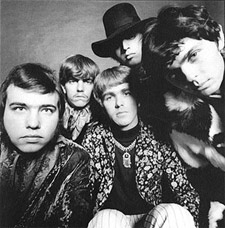 By late 1967, the Electric Prunes had two hit singles under their belt: the garage band classics ‘I Had Too Much To Dream Last Night’ and ‘Get Me To The World On Time.’
By late 1967, the Electric Prunes had two hit singles under their belt: the garage band classics ‘I Had Too Much To Dream Last Night’ and ‘Get Me To The World On Time.’
The L.A. quintet’s debut LP included both songs, but after their second album failed to deliver a follow-up hit, manager Lenny Poncher and producer Dave Hassinger – who together owned the rights to the band’s name – decided to change to formula.
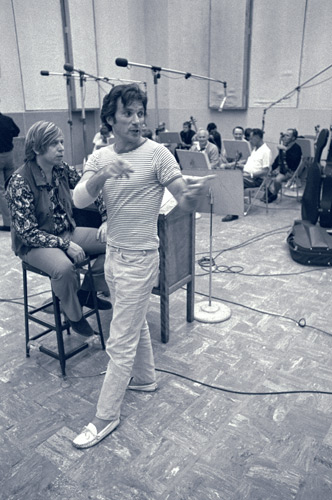 They brought in David Axelrod – conveniently, another of Poncher’s clients. Their idea – a rock version of the Catholic mass – was perfect for the adventurous composer and arranger.
They brought in David Axelrod – conveniently, another of Poncher’s clients. Their idea – a rock version of the Catholic mass – was perfect for the adventurous composer and arranger.
While hardly a household name, Axelrod was a prolific presence during the era, working with everyone from Stan Kenton and Cannonball Adderley to Lou Rawls and The Man From U.N.C.L.E. star David McCallum.
Having just completed gospel legend Clara Ward’s Soul and Inspiration, and already slated to produce The Bible, a collection of sacred film themes for composer David Rose, Axelrod was no stranger to incorporating the two seemingly exclusive domains.
After his one stipulation – that the mass be sung entirely in Latin – was agreed upon, he went to work. As a staff producer on loan from Capitol Records (The Prunes recorded for Reprise) he was allotted precisely one week away from the company.
He spent the first few days writing, which left three nights to record the entire album.
Three hours into the initial session, Hassinger banished most of the Prunes from the studio.
Contrary to popular myth, they did perform on the disc –and the belatedly-released Stockholm ’67 shows them to be first-rate live act – but Axelrod had brought sophisticated music charts, and there wasn’t sufficient time available to teach them the intricate arrangements.
Instead, the Wrecking Crew – a loose conglomerate of musicians heard on hundreds of records during the era (‘ringers’ as Axelrod calls them) – played on the majority of the album.
Augmented by four cellos and as many French horns, the sound was absolutely unique; ethereal, atmospheric, and clearly reverent.
Despite the decidedly crass, sales-centric beginnings, Axelrod transformed the project into something genuine and heartfelt.
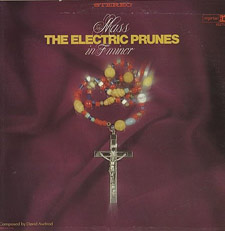 Released in January, 1968, it’s arguably the first ever ‘Christian rock album.’
Released in January, 1968, it’s arguably the first ever ‘Christian rock album.’
The song titles alone – ‘Gloria,’ ‘Credo,’ Sanctus,’ ‘Benedictus,’ and ‘Agnus Dei’ – made clear where the focus lay, and the liner notes were straightforward and unequivocal: “Christian worship has forms as many as the creative energies of Man. The Mass in F Minor is one of these.”
Despite such transparency, the album was ignored by the church. ‘Kyrie Eleison’ – the only track to include the entire Prunes band – would find a massive audience the following year, when it was featured in Easy Rider, one of the biggest films of the decade.
The nascent Rolling Stone – already a bastion of all that was hip – hated the record, stating: “a falsetto-tinged, off-tuned, weak-voiced, entirely repugnant howl emanates from the group…like tone-deaf monks…[who] almost make it worth owning as an unintended joke.”
Time magazine was more impressed, describing it as “One of the most venturesome of recent rock recordings.”
 Reprise ordered a follow-up, increasing the budget to include a full scale orchestra. Axelrod took another week off, and composed a second opus – this one, in English.
Reprise ordered a follow-up, increasing the budget to include a full scale orchestra. Axelrod took another week off, and composed a second opus – this one, in English.
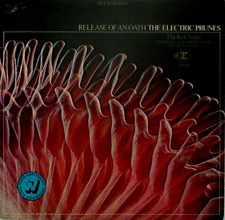 Based on the Kol Nidre, a sacred prayer recited on the eve of Yom Kipper (the holiest day in the Jewish calendar), Release of An Oath is every bit the equal of its predecessor.
Based on the Kol Nidre, a sacred prayer recited on the eve of Yom Kipper (the holiest day in the Jewish calendar), Release of An Oath is every bit the equal of its predecessor.
Tracks like ‘Holy Are You’ and ‘The Adoration’ balance devotion with stellar musicianship. If Mass was the first Christian rock album, this might be considered the first Jewish rock album.
The entire work clocks in at just 24 minutes, but it feels complete – like a self-contained worship service.
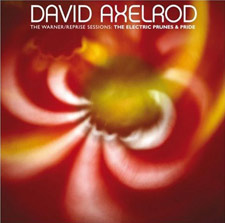 Both albums have been reissued domestically, but the UK-only double-disc set The Warner/Reprise Sessions: The Electric Prunes & Pride is the one to seek out.
Both albums have been reissued domestically, but the UK-only double-disc set The Warner/Reprise Sessions: The Electric Prunes & Pride is the one to seek out.
Each album is included in both its original form, and with the vocals stripped, showcasing the arrangements in an entirely different light.
 The set also includes the self-titled 1970 LP from Pride. In this case, there was no band to begin with; Pride never existed. It was nothing more than a record deal that management had negotiated with Reprise.
The set also includes the self-titled 1970 LP from Pride. In this case, there was no band to begin with; Pride never existed. It was nothing more than a record deal that management had negotiated with Reprise.
Axelrod dutifully put pen to paper, wrote an LP’s worth of tunes, and rounded up the usual suspects. Songs like ‘The Truth,’ ‘In the Wilderness,’ and ‘Worthless Pleasures,’ are as weighty as ever, but for this one, the lyrics were written by his son, Michael.
A third Axelrod/Prunes album was okayed for January 1969. Based on Goethe’s Faust, Axelrod composed the piece, and got as far as recording basic tracks before a falling out between Hassinger and the label caused it to be abandoned before completion.
 The project was thought lost until 1999, when an acetate was located. Axelrod had forgotten it even existed, and had no recollection of the original lyrics. Rather than attempting to rewrite, he decided to add strings to the acetates. The result is every bit in keeping with his previous works, and comes across as fully realized in spite of the lack of vocals.
The project was thought lost until 1999, when an acetate was located. Axelrod had forgotten it even existed, and had no recollection of the original lyrics. Rather than attempting to rewrite, he decided to add strings to the acetates. The result is every bit in keeping with his previous works, and comes across as fully realized in spite of the lack of vocals.
Fittingly, the album was released under the straightforward title David Axelrod by MoWax in 2001.
In all but name, Mass In F Minor and Release Of An Oath were Axelrod solo albums, something Capitol was well aware of. Chuffed at one of their own receiving kudos for product released by the competition, they offered him a solo contract immediately after Time ran its review.
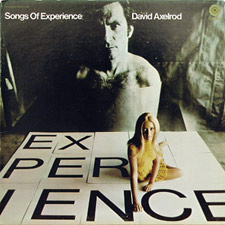
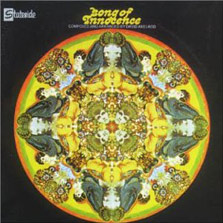 His first two efforts – 1968’s Songs of Innocence and Songs of Experience (1969), were based on the poems of William Blake. 1970’s Earth Rot dealt with environmental issues, and included verses from Isaiah. David Axelrod’s Rock Interpretation of Handel’s Messiah came out the following year. All are well worth seeking out.
His first two efforts – 1968’s Songs of Innocence and Songs of Experience (1969), were based on the poems of William Blake. 1970’s Earth Rot dealt with environmental issues, and included verses from Isaiah. David Axelrod’s Rock Interpretation of Handel’s Messiah came out the following year. All are well worth seeking out.
 Later releases were sporadic, but 1993’s Requiem: The Holocaust showed he was still dealing with serious subject matter.
Later releases were sporadic, but 1993’s Requiem: The Holocaust showed he was still dealing with serious subject matter.
Axelrod’s sound was considered bold and contemporary at the time, and the ensuing decades have done nothing to challenge that notion. These days, his work is reaching a whole new audience, with the likes of Fat Boy Slim, DJ Premier, De La Soul, U.N.K.L.E., Dr. Dre, the Beatnuts, Lauryn Hill, Mos Def and Josh Davis a/k/a DJ Shadow all sampling from his formidable catalogue.
See also How prog rock met avant garde in church
© John Cody 2010